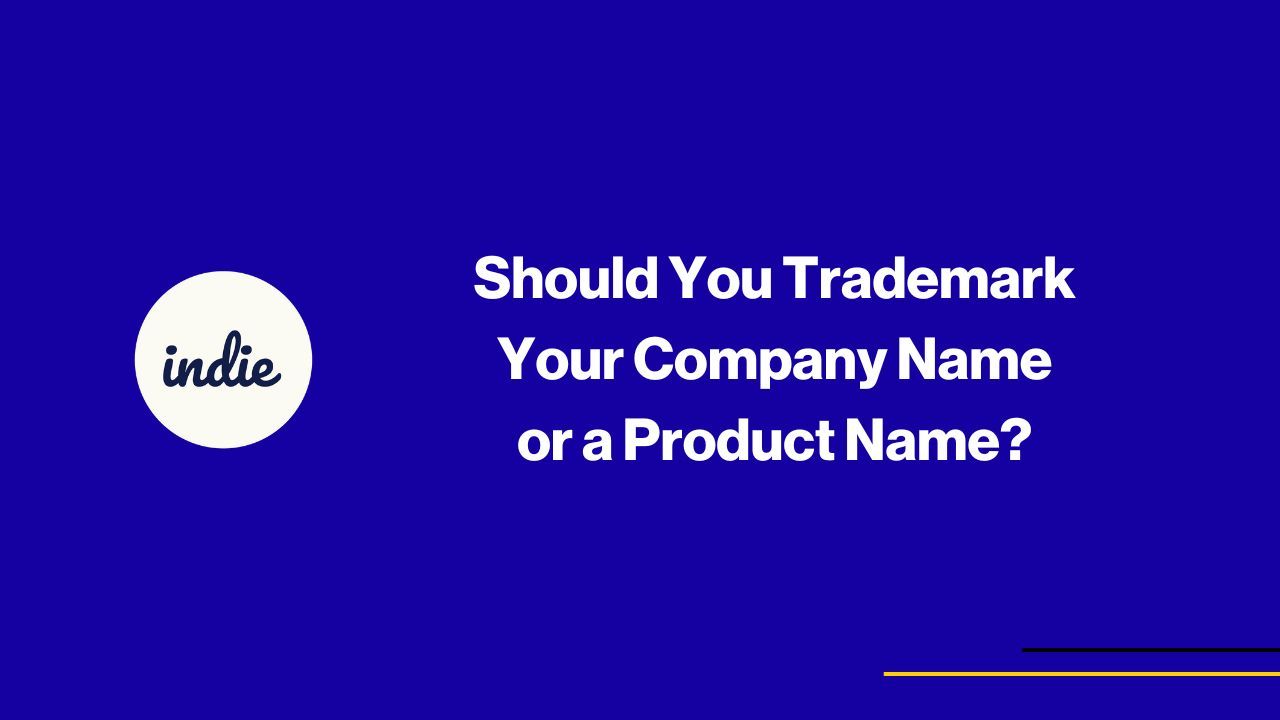If you’re wondering whether to trademark your company name or a product name, you’re not alone. Many business owners struggle with this decision, and it’s not always clear what’s best for your brand.
What Is a Trademark, and Why Is It Important?
A trademark legally protects identifiers like names, logos, or slogans that distinguish your brand. By registering a trademark, you ensure others in your industry cannot use something similar, helping you protect your brand identity and reputation.
Examples of trademarks:
- Company Name: Amazon, Coca-Cola, or Nike.
- Product Name: iPhone (Apple), Big Mac (McDonald’s), or Tide (Procter & Gamble).
To learn more about what trademarks protect, visit the U.S. Patent and Trademark Office (USPTO).
1. Should You Trademark Your Company Name?
Trademarking your company name is ideal if your business relies on a single, unified identity to attract and retain customers.
Benefits of Trademarking Your Company Name:
- Broad Brand Protection:
Your company name becomes legally protected, ensuring no competitor can use it or a confusingly similar name in your industry. - Unified Branding:
If your company name is central to your identity, customers will associate it with all your products and services. For example, Amazon has trademarked its company name, making it synonymous with its brand. - Scalability:
A company-name trademark makes it easier to expand into new markets or launch additional products without needing separate trademarks.
When It’s the Right Choice:
- You plan to market your business as one cohesive brand.
- Your company name is your primary selling point (e.g., law firms, personal brands).
- You want broad protection across all products and services.
2. Should You Trademark a Product Name?
If your products or services are distinct from your company’s identity or target different audiences, trademarking specific product names can be more effective.
Benefits of Trademarking a Product Name:
- Clear Differentiation:
Product trademarks help create a unique identity for individual offerings, making them easier to market. For example, Tide is a trademarked product of Procter & Gamble, yet customers often don’t know the parent company. - Targeted Marketing:
A product-specific trademark allows for tailored branding and advertising, especially in competitive markets. - Legal Flexibility:
By trademarking a product name, you protect that offering independently of your company, which can be helpful if you discontinue or sell the product.
When It’s the Right Choice:
- You manage multiple brands or product lines that serve different audiences.
- Your products have stronger recognition than your company name.
- You want to build equity in individual product names for potential licensing or sales.
3. Can You Trademark Both?
Yes! Many businesses choose to trademark both their company name and product names. While this approach requires more effort and cost, it provides the most comprehensive legal protection and branding flexibility.
Examples:
- Apple Inc.: Apple trademarks its company name, as well as its products like iPhone, iPad, and MacBook.
- Microsoft: Microsoft protects its company name and individual products like Windows and Xbox.
When to Consider Both:
- Your company and products have strong, separate identities.
- You want maximum protection for your brand portfolio.
4. Do You Need to Include in a Trademark?
In most cases, no. Legal designations like “LLC” or “Inc.” aren’t required in trademarks and often aren’t considered distinctive enough to warrant protection. The USPTO typically excludes these terms from trademark applications.
Exception:
If the legal suffix is critical to how your brand is identified (e.g., “The Burger Shack LLC”), you might include it in your trademark. However, this is rare.
5. How to Decide: Key Questions to Ask
- What’s more recognizable: your company name or product name?
If customers know your products better than your company, trademark the product name. - Do you plan to sell multiple products or services?
If so, separate trademarks may offer more flexibility. - What are your long-term goals?
If you’re building a cohesive brand, trademarking the company name is often better. For a multi-brand strategy, product trademarks are more effective.
Costs and Considerations
Trademarking a name involves filing an application with the USPTO, which typically costs $250–$350 per class of goods or services. The process can take several months to complete.
For details on filing fees and timelines, visit the USPTO Fee Schedule. If you’re filing internationally, check out the World Intellectual Property Organization (WIPO) for global trademark protections.
6. SEO and Branding Implications
Your trademark decision impacts how customers find and interact with your brand online.
- Company Name Trademark: Boosts SEO if customers search directly for your business name.
- Product Name Trademark: Helps capture search traffic for specific products or services.
Pro Tip: Use tools like Google Keyword Planner to research how people are searching for your company and product names. This data can guide your trademark strategy.
Conclusion: What Should You Trademark?
The decision to trademark your company name or product name depends on your business structure, goals, and target audience.
- Trademark Your Company Name if you want to build a unified brand and protect your overall business identity.
- Trademark a Product Name if your products need unique branding or cater to distinct audiences.
- Do Both if you want comprehensive protection and flexibility.
For personalized advice, you might want to reach out to a friendly trademark attorney at Sleight Law. We’re here to help you assess your needs and smoothly navigate the application process!

